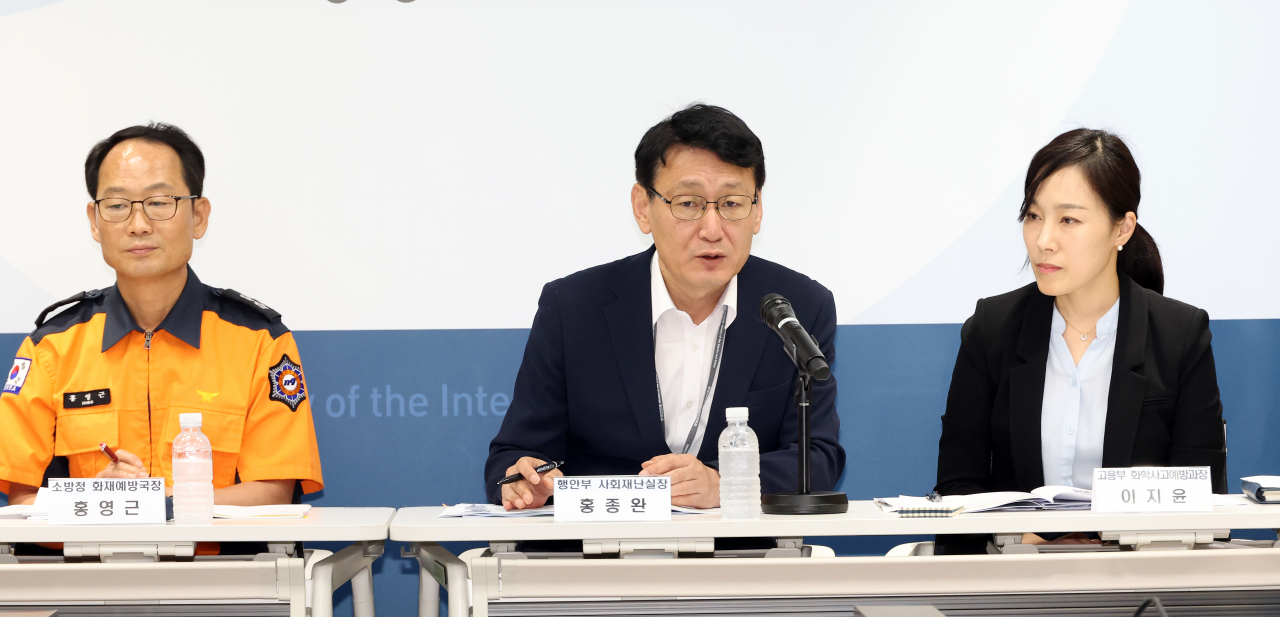 |
Deputy Minister to the Ministry of Interior and Safety’s Societal Disaster Management Office Hong Jong-wan (center) speaks during a press briefing on the government’s safety management standards set to prevent mass fires and explosions in battery factories at Government Complex Sejong, Tuesday. (Newsis) |
The South Korean government announced a set of measures to prevent fires and explosions in battery production factories by proposing specific safety management standards for such factories on Tuesday.
The recent set of measures comes after the fatal fire at a lithium battery plant in Hwaseong, Gyeonggi Province, on June 24, which resulted in 23 deaths. Since the incident, a task force consisting of officials from the Ministry of Interior and Safety as well as other ministries and experts was formed, with the goal of reducing battery factory fires and minimizing further human and material damages from such fires.
On Tuesday, the government announced that amendments will be made to the Fire Prevention and Safety Control Act, where lithium batteries will be designated as a “special flammable material.”
Designating lithium batteries as special flammable materials, which are defined as materials that pose lower fire hazards but are difficult to extinguish as they spread rapidly, will help to set specific standards by law on how to stack and store lithium goods and will require factories that deal with lithium materials to be built with fireproof structures and smoke-proof materials.
In the case of the factory fire at Hwaseong, the fire was seen to have been caused and to have had a bigger impact due to lithium batteries being stacked on top of one another in one place.
The government added that only non-combustible materials, such as concrete and bricks, will be allowed to be used to build the exterior walls of factories dealing with special flammable materials such as lithium. Semi-combustible materials, such as sandwich panels previously allowed for these factories, were heavily criticized for their high fire risk following the factory fire in June.
The government will also work to develop fire extinguishers deemed effective in extinguishing fires caused by lithium batteries, by first setting fire extinguishing standards for dealing with such fires by December this year. Other materials, such as fire extinguishing agents used specifically for extinguishing lithium battery-caused fires, will be developed by 2028. Specialized sensor systems that can both predict and detect fires caused by batteries will also be developed to be installed inside battery factories by 2028.
By law, factories dealing with special flammable materials will also be required to install alarms equipped with flashing lights to aid quick evacuation, as well as provide masks specifically for fire evacuation.
As many workers at such factories, including victims of the Hwaseong factory fire, are foreign nationals, the government added that it would make basic safety and health education mandatory for all foreign workers entering the country, including education on proper fire evacuation methods as well as safety guidelines in dealing with harmful chemical substances.
The measures would cover all workers on E-9 and H-2 visas. However, many foreign workers are in Korea on other visas, including some of the victims of the Hwaseong factory fire.
Up to 200 factories that are at risk of fire and explosion that have not been inspected and supervised within the last three years will undergo inspection led by the Ministry of Employment and Labor by the end of 2024. Among the 200 factories, the government will also provide support to those that require assistance in installing facilities and supplies needed for extinguishing fires and proper evacuation.
“The government will thoroughly manage and check the implementation status of such changes on-site, by revising relevant laws and enforcing regulations with relevant organizations to make sure that the prepared measures are applied on the field as soon as possible,” said Interior Minister Lee Sang-min Tuesday.







